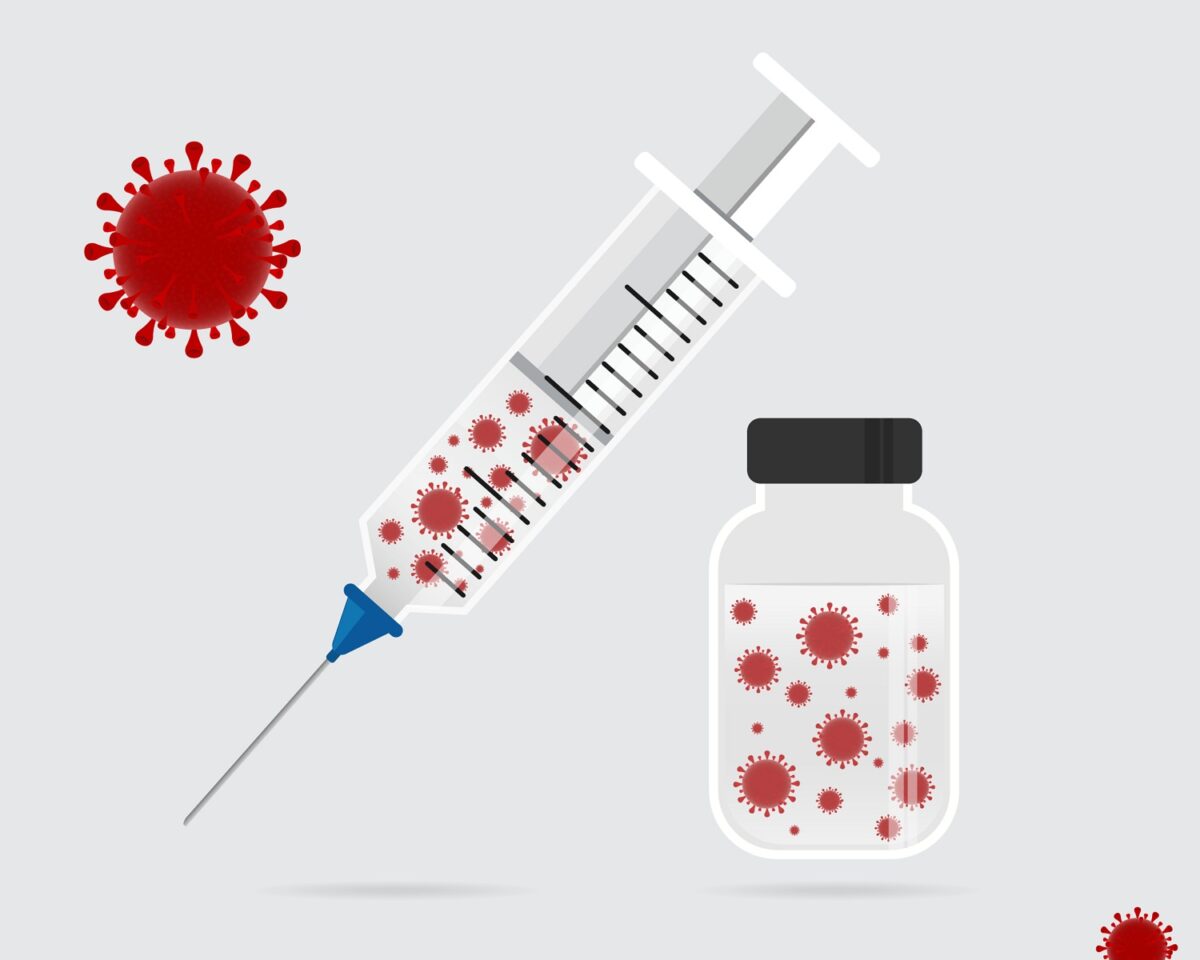Professor Gerry Graham is holder of the Gardiner Chair of Immunology at the University of Glasgow and is a world expert in immunology with a particular focus on the study of chemokines and their receptors. He has over 30 years’ experience working in this area and publishes widely in the top international journals. He is a regular invitee to major international conferences.
He is currently chair of the Wellcome Trust Expert Review Group in the Immune System in Health and Disease and has been involved with numerous other national and international funding agencies. He is a Fellow of the Royal Society of Edinburgh and recipient of a Wolfson Royal Society Research Merit Award. His work is funded by an MRC Programme Grant and a Wellcome Investigator Award.
Introduction
It is now more than a year since the novel Coronavirus, COVID-19, was identified in China and more than ten months since the World Health Organisation declared COVID-19 a global pandemic. The virus has taken an enormous toll on the health of the world population with over 100m cases and a tragic 2.24m deaths reported. COVID has also created economic instability due to the lost productivity and lower consumption brought on by continued lockdown measures in many parts of the world.
However, the arrival of the first COVID vaccine at the end of 2020, and the subsequent approval of several more, is likely to prove to be a major turning point in our fight against the virus. All of the vaccines approved so far provide excellent efficacy against falling ill from COVID and over 100m doses have now been administered worldwide. In the coming months, as at-risk groups such as the elderly and those with compromised immune systems continue to be vaccinated and gain immunity, death rates should decrease quickly – easing the strain on stretched national healthcare systems and allowing lockdown measure to be eased in certain parts of the world.
To gain further insight into the vaccines themselves and the path out of the economic and social turmoil many of us currently find ourselves in, we once again turn to Professor Gerry Graham, leading Immunologist and Director of the Institute of Infection, Immunity, and Inflammation at the University of Glasgow. He has provided Edinburgh Partners with invaluable expertise over the course of the pandemic and what follows is a recent conversation he had with Lauran Halpin, Investment Manager and Healthcare Analyst.
A Dialogue with Professor Gerry Graham FRSE
Q. Thank you for joining us again, Professor Graham. It would be good to start with your thoughts on where we are now in terms of COVID-19 vaccines and their ability to prevent both illness and spread of the virus?
A. We certainly appear to be at an inflection point in our continued fight against COVID-19 thanks to the approval of a handful of vaccines for the virus. These vaccines appear safe and effective at protecting those vaccinated from the effects of the virus which will be invaluable in ensuring the health of the elderly and those with compromised immune systems – two of the groups most susceptible to severe COVID-19 infection. The vaccines also appear to be effective at supressing the spread of the virus in the population by preventing many asymptomatic carriers from passing the virus on to others – new data on the Oxford / AstraZeneca vaccine shows a substantial reduction in viral spread from those vaccinated – which provides a credible ‘way out’ of lockdown measures and their attendant social and economic pressures.
The vaccines are also likely to provide long lasting immune protection from COVID-19 just as vaccines do for other viruses such as those responsible for the flu or shingles. The press has reported examples of individuals becoming reinfected with COVID-19 relatively quickly after the initial infection but this appears to be a very isolated phenomenon – with very few documented cases of reinfection out of 100s of millions of global cases since the pandemic began. It is far more likely that vaccines will provide significant, sustained protection against the virus for at least several months if not years. Yes, regular vaccination may be required, as it is with the flu, but this may be to combat the variants circulating in the community as opposed to worries over a dimming immune response. Recent data suggest that most individuals have high levels of antibodies at least six months after becoming infected with COVID-19 and, given that vaccination provides exposure to elements of the virus in much higher concentrations than community infection, it follows that vaccination will confer antibodies for at least as long if not longer.
Q. What do you think of some countries such as the United Kingdom choosing to extend the time between the initial and follow-up doses of the vaccine in order to give more people at least some protection against the virus?
A. The important thing to remember is that the three-to-four-week window between first and second injections for COVID-19 vaccines was a construct of the clinical trials used to determine their safety and efficacy, not a construct of rational science. The window was arbitrary and used to study the data, not prescribe a vaccination regime under real world conditions. So giving more people an initial dose and conferring at least some efficacy seems like a sensible decision. Most protection against the virus is conferred with the initial shot – even with the Pfizer vaccine – so waiting a number of months to top up protection with the second dose will allow herd immunity within the community to build faster thus allowing cases, hospitalisations, and death rates to fall faster.
Q. Will the vaccine be effective against the variants of COVID-19 which have emerged in United Kingdom, South Africa, Brazil, etc?
A. Mutations leading to new variants of COVID-19 should be expected as the virus spreads rapidly within a community and replicates within the cells of those infected. And whilst it is possible that a mutation could arise that renders the vaccines ineffective against the virus, the immune response created by the available vaccines should be at least somewhat effective against the current crop of variants.
The COVID-19 vaccines on the market teach the immune system to recognise the spike protein on the surface of the COVID-19 virus and launch an immune response to prevent the virus from entering an individual’s cells and causing illness. The mutations in the most common variants make it easier for COVID-19 to infect people but do not appear to alter the structure of the spike protein to the extent that the immune response generated by the vaccine, in the form of antibodies, will not recognise the virus and prevent infection. This is because the immune system creates what is called a polyclonal immune response which allows antibodies to recognise several different sites on a virus to which they bind in order to render the virus unable to cause infection.
The one caveat to this at the current time is the B.1.351 variant identified in South Africa in December 2020 which has now spread to at least 24 countries. Recent data on the Oxford / AstraZeneca vaccine suggests that it is not very effective at preventing mild-to-moderate COVID symptoms in those individuals infected with the South African variant and it could be that vaccines from other manufacturers provide similar levels of protection. This could be because the antibodies the vaccines encourage individuals to produce are not able to ‘grab on’ to the virus tightly enough to totally prevent symptoms. However, there are a few points worth considering. Firstly, whilst vaccinated individuals could still potentially experience a relatively mild set of symptoms if infected with the South African variant, the vaccines are still effective at preventing severe cases of the virus which will help keep people from needing hospital treatment or from dying. Secondly, the structure of the currently approved vaccines can be ‘tweaked’ through a relatively simple process such that they provide good levels of immunity to the South African variant and others that may emerge. This process of tweaking the vaccine to teach the immune system to better respond to new variants should take several weeks to a few months of development to achieve and then should be available to the public without the need for further clinical trials. Healthcare systems around the world can then offer already inoculated individuals a booster shot to improve immune response.
Q. Is there anything that has surprised you about the vaccines or their development?
A. Certainly, the ease with which the vaccines were developed has been a surprise. Historically, it has taken several years to develop a credible vaccine but advances in understanding of virus DNA/RNA as well as technologies like virus nanoparticles, coupled with the urgency surrounding the current pandemic, have allowed COVID-19 vaccine development to move much quicker. COVID-19 is the first Coronavirus for which we have been able to develop even a single vaccine so the approval of several effective, safe vaccines in less than a year is truly astonishing. It is also surprising that several different technology platforms have been used to create the current crop of vaccines (such as recombinant protein, messenger RNA, and adenovirus technology1) and they have all produced successful results.
1. Recombinant protein, messenger RNA, and adenovirus technology all refer to the methods through which a portion of the COVID-19 virus’s genetic sequence is shuttled into an individual’s cells such that these cells could then use that genetic sequence to build a small portion of the virus. This portion of the virus does not make an individual ill but teaches the immune system to launch a response to intercept and destroy the COVID-19 virus when it enters the body.
Finally, the high level of efficacy the approved vaccines are displaying is tremendously positive. Each of the vaccines which has reported Phase III trial results to date has achieved at least 60%
efficacy at preventing a vaccinated individual from getting COVID-19 symptoms with some, such as those developed by Pfizer / BioNTech and Moderna, reporting greater than 90% efficacy. This is an almost incredible achievement and one which will undoubtedly help the world finally move beyond the pandemic safely and relatively quickly.
Q. For those countries lucky enough to have secured adequate supply of one or more of the vaccines, what might life look like by the end of 2021?
A. If countries such as the UK and US continue to rapidly immunize the elderly and other at-risk groups, we should see death rates drop dramatically by the middle of the year. This is because most hospitalisations and almost 90% of deaths are in over 65’s. If hospitalisation and death rates fall, lockdowns should be able to be eased in areas where vaccinations have taken place, though test and trace will have to remain a feature for some time to monitor community transmission and the emergence of new variants. However, viruses tend to only mutate easily when transmission is high within a community, so reducing transmission through vaccination also reduces the potential for new variants.
Q. Presumably, the picture is quite different for poorer countries or for those which were slower in securing purchase orders for vaccines?
A. It is paramount that developed nations share the vaccine technology with emerging economies not only because it is the right thing to do from a humanitarian standpoint but for self-serving reasons as well. If the entire world population (or enough of it to achieve herd immunity) is not vaccinated against COVID, then places with low vaccination levels could still experience community spread and become reservoirs for potential mutations and new variants. The more often we have mutations, the greater the chance is that one of them will be resistant to current vaccines. Vaccinating the world population will also be important for re-starting widespread global travel. It is of little good if one country has a robust vaccination programme yet allows people from all over the world to enter – including individuals from countries with very low vaccination rates who may be carrying new variants of the disease.
Another way for countries with robust vaccination programs to potentially speed up the global vaccination process is to encourage countries to explore the route China and India have gone down and develop their own COVID vaccines. Many countries should theoretically have the capability to create clinically safe and effective vaccines but may lack access to intellectual property or manufacturing capacity so making these available to countries interested in self-development could be a useful way to speed up the global effort to eradicate the virus.
Thank you, Professor Graham.
Lauran Halpin MSc, BS
Investment Manager
Conclusion – Economic and Market Implications
Professor Graham was remarkably prescient in the original discussion of the virus
(Covid-19: What Can Science Tell Us and What Are the Implications?)
His conclusions at that time were that there would be a vaccine by early 2021, that treatments for the virus would improve and that mutations would be limited and manageable. Our view was that if this were to be accurate the market would draw the conclusion that the virus problem was ‘bounded’ such that greater confidence could return. This remains the case. From here we can expect rapidly falling mortality rates and slower transmission. Certainly, new variants will continue to emerge but they should be swiftly countered by altering existing vaccines. There will be associated economic damage but it will also be bounded.
The market implications are now therefore not so much about the virus as the economic landscape we face. Policy measures post GFC have left an entrenched market view that the authorities can be relied upon to underwrite asset prices. The associated mis-pricing of the cost of money has both inflated and distorted asset prices. Economic growth has been sustained by borrowing, and this was taken to unprecedented levels with the support given to counter the shut-down occasioned by the pandemic. Thus far this has appeared to some to be cost free given how interest rates have been successfully repressed in the sense that the total carrying cost of debt has not increased significantly. The inflation dog has not yet barked which has allowed the asset wagon train to continue. However, this is a fragile edifice. With many developed economies carrying public debt in excess of GDP any upward shift in the cost of borrowing will have a profound effect. Similarly, in private debt markets it is almost certain that leverage will have risen progressively over the past ten years and not always to robust homes.
At some point either the markets will of their own accord turn to considering an exit strategy on the question of debt, or they will be prompted to do so by some external event. This will prompt a swift reappraisal of absolute and relative asset prices. Hitherto all bad news was good news for markets since it prompted ever looser policy. The paradox of the good news on vaccines is that it may prove ultimately be bad news for markets. The better the economic news seems to be the harder it will be to argue for asset market support. As attention turns the level of debt overhang it is likely to be accompanied by a more sober review of prospects.
About the Author
Lauran Halpin MSc, BA: Lauran Joined EP in November 2013 from Baillie Gifford with 7 years of investment experience. Lauran Joined Baillie Gifford in September 2007 as a graduate trainee, where she undertook a three year rotational programme spent analysing European and North American Equities as well as Corporate Bonds. In June 2010, she was made Baillie Gifford’s global Healthcare analyst. Whilst at Baillie Gifford, she managed the Glenfinlas Global Healthcare fund. The fund was an unconstrained, global best ideas in Healthcare fund.
Lauran has an MSc. in Ecological Economics from University of Edinburgh 2005 and BS. in Biology from Davidson College (North Carolina, USA) 2003.
Lauran is responsible for researching the global Healthcare and Automotive sectors and assisting in the management of client portfolios.
Important Notes
The views expressed within are those of the author and no reliance should be placed on, the fairness, accuracy, completeness or correctness of the information or opinions contained herein. Edinburgh Partners shall not have any responsibility or liability for any loss howsoever arising from any use of this document The information set out herein may be subject to updating, completion, revision, verification and amendment at any time and such changes may be material.
The value of an investment and the income from it may go down as well as up.
This document has been issued and approved by Edinburgh Partners Edinburgh Partners Limited, 27-31 Melville Street, Edinburgh EH3 7JF. Registered Office 27-31 Melville Street Edinburgh EH3 7JF. Registered in Scotland SC243661. Authorised and regulated by the Financial Conduct Authority, 12 Endeavour Square, London E20 1JN



